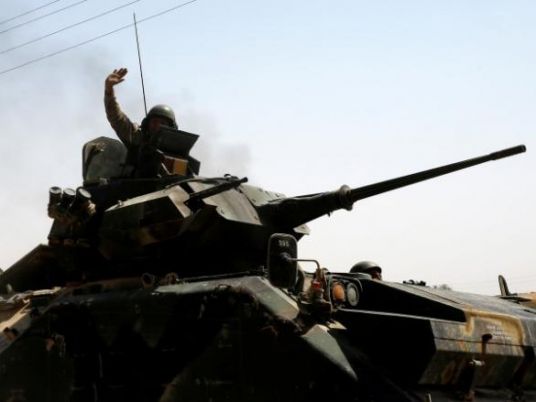
Rebels supported by Turkey fought Kurdish-backed forces in northern Syria on Saturday, as Ankara ratcheted up its cross-border offensive by saying it had launched air strikes against both Kurdish forces and Islamic State.
Turkey's government, which is fighting a Kurdish insurgency at home, has said the Syrian campaign it opened this week is as much about preventing Kurdish militia fighters from gaining territory in Syria as about pushing back Islamic State.
Turkey wants to stop Kurdish forces gaining control of a continuous stretch of Syrian territory on its frontier, which it fears could embolden the Kurdish militant group PKK, which has waged a three-decade insurgency on Turkish soil.
Turkish security sources said two F-16 jets bombed a site controlled by the Kurdish YPG militia, which is part of the broader U.S.-backed Syrian Democratic Forces (SDF) coalition. The sources also said the jets hit six Islamic State targets.
Turkish military sources said one of its soldiers was killed and three others wounded when a tank was hit by a rocket that they said was fired from territory held by the Kurdish YPG. The sources said the army shelled the area in response.
Syrian rebels opposed to Ankara's incursion said Turkish forces had targeted forces allied to the YPG and no Kurdish forces were in the area.
On the ground, Turkish-backed Syrian rebels fought forces aligned with the SDF near the frontier town of Jarablus. Forces opposed to Ankara said Turkish tanks were deployed, a charge denied by Turkey's rebel allies.
In Turkey, suspected Kurdish militants fired rockets at the airport in the main southeastern city of Diyarbakir, sending passengers and staff scrambling for shelter, Dogan news agency said. There were no reports of casualties.
Turkey's offensive into Syria began on Wednesday, supporting its rebel allies with Turkish special forces, tanks and warplanes. It seized control of Jarablus from Islamic State seeking to stop any Kurdish forces moving in first.
Saturday's use of warplanes against what Turkey said was a Kurdish YPG militia target highlights its determination to prevent any Kurdish territorial expansion in north Syria.
Any action against Kurdish forces in Syria puts Turkey at odds with its NATO ally the United States, which backs the SDF and YPG, seeing them as the most reliable and effective ally in the fight against Islamic State in Syria.
It adds complexity to the Syrian conflict that erupted five years ago with an uprising against Syrian President Bashar al-Assad and has since drawn in regional states and world powers.
"Dangerous escalation"
The Jarablus Military Council, part of the SDF, had said earlier on Saturday that Turkish planes hit the village of al-Amarna south of Jarablus, causing civilian casualties. It called the action "a dangerous escalation".
The Kurdish-led administration that controls parts of northern Syria said Turkish tanks advanced on al-Amarna and clashed with forces of the Jarablus Military Council. But the Kurdish administration said no Kurdish forces were involved.
However, the leader of one Turkey-backed rebel group gave a rival account. He told Reuters the rebels battled the Kurdish YPG around al-Amarna and denied any Turkish tanks took part.
Turkish security forces simply said Turkish-backed forces had extended their control to five villages beyond Jarablus.
A video released by Turkey's military showed the Turkish Red Crescent distributing food and aid to people in Jarablus, with the help of Turkish troops. It also showed what appeared to be Turkish-backed rebels flicking v-for-victory signs in the town.
The newly formed Jarablus Military Council has said it was made up of people from the area with the aim of capturing the town and the surrounding region from Islamic State militants. However, the Turkish-backed rebels seized Jarablus first.
Several militias under the SDF banner pledged support to Jarablus Military Council after it reported the Turkish bombing.
The Northern Sun Battalion, an SDF faction, said in a statement it was heading to "Jarablus fronts" to help the council against "threats made by factions belonging to Turkey".
Tension has mounted in Syria's Aleppo region in the past year between the U.S-backed Kurdish YPG force and its allies on one hand and Turkish-backed rebel groups on the other. The two sides have clashed on several occasions.



